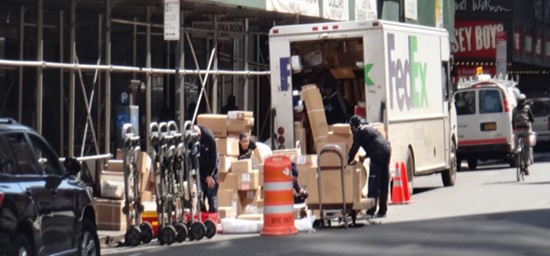United States - European Commission Urban Freight Twinning Initiative: Compendium of Project Summaries, Volume II
Overview of 2018-2019 International Urban Freight Roundtables
| Research | United States |
Developing an Eco-Transfer System for Urban Deliveries
Drivers of commercial vehicles often find that making deliveries in a large metropolitan area is a major challenge due to congestion and lack of parking space. Nowadays, commercial deliveries produce negative externalities such as congestion, emissions, and traffic safety issues. Fostering sustainable delivery modes such as cargo bikes and handcarts provide a promising solution to the problem; however, such modes have a limited distance range and need space to transfer goods. In addition, transferring goods to cargo bikes involves multiple stakeholders: public agencies, local community, motor carriers, and the sustainable last-leg delivery industry. The goal of this project is to develop an Eco-Transfer System. The project will: (1) Identify locations and time windows of the transfer sites based on the delivery demand, parking supply, and road network condition; (2) Identify barriers, legal or otherwise, to implementation of an Eco-Transfer System; (3) Gain the support of public and private sector stakeholders; and (4) Design a preliminary plan for the implementation of the Eco-Transfer System. This research project is funded by the New York State Energy Research and Development Agency. The research team is led by the Rensselaer Polytechnic Institute (RPI); research partners include City College of New York and Revolutions Rickshaws.

An improvised transfer area by parcel delivery workers—an illegal use of the curbside.
Source: Rensselaer Polytechnic University.
Project Type
Research.
Period of Performance
November 2017 - May 2019.
Project Site
New York, New York, USA.
Contact
Cara Wang
Associate Professor
Rensselaer Polytechnic Institute
Troy, New York, USA
Wangx18@rpi.edu
(518) 276-2098
Topics Addressed
- Air quality/environment.
- Curbside delivery and parking.
- Economic competitiveness.
- Energy consumption.
- Land use interaction.
- Last mile delivery.
- Livability/quality of life.
- Logistics/distribution.
- Mobility/congestion.
- Supply chains.
Expected Outcomes
- Diagnosis of the Manhattan area's freight demand, parking space availability, and road network conditions.
- An analysis of the market acceptability for this initiative and legal issues regarding its implementation.
- A preliminary Eco-Transfer System design, a pilot test, and analysis of the corresponding results.
Stakeholder Involvement
The project explicitly requires interviews of the stakeholders involved to gain a thorough understanding of the market and concerns from the public and private sector. Public-sector and private-sector representatives, including traffic management and parking enforcement agencies, truckers, receivers, and potential providers of the sustainable last-leg delivery, will be interviewed.